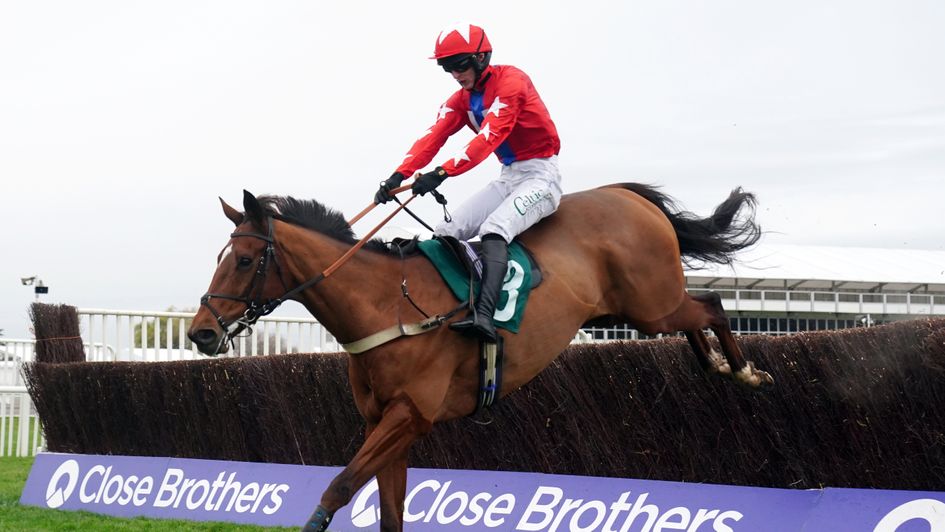Cornelius Lysaght talks to Simon Claisse about his remarkable 20-year career at Cheltenham which took in huge stories both on and off the track.
Revered by many...
When a date was confirmed for Simon Claisse’s departure from the pivotal jumps racing role of Cheltenham’s clerk of the course after 20 Festivals at the helm, the track’s long-serving head groundsman, Ben Hastie, set about producing a compilation of video-tributes to his boss.
Such was the extent of the take-up by trainers, jockeys, colleagues, media, family and friends that literally dozens of clips were recorded on mobile phones across Britain and Ireland and pinged over to Hastie who put together a film running practically to the duration of a modern-day blockbuster – and with livelier content than some.
One from Richard Pugh, a senior figure at Tattersalls auction house, which runs National Hunt sales at Cheltenham, stood out.
He concluded: “Racing, like every sport and like every aspect of society, has had to evolve – with safety, with horse welfare and many other challenges – and Simon knew exactly how to evolve them appropriately, [and] he also knew where and how to hold the line to retain the fibre and culture of our industry."
Overseeing development and change
One hundred percent: over two decades there has, of course, been masses of change at Cheltenham, particularly at the Festival – itself extended from three to four March days in 2005 – but while safety standards for all participants and the management of the racing surface have altered, Claisse’s own philosophy that “the horse comes first” has continued to feel like the default position.
Reflecting on his period in a role that technically means that he’s been in charge of jumping’s number one track – and consequently highly influential across the sport – the dapper 61-year-old said: “To do the job of the clerk successfully you’ve got to develop the right relationships, and you have to work on that, and I’ve been very lucky that I’ve hopefully managed to get it about right.
“I think I’ve achieved a great deal in 20 years – a huge amount has changed [at Cheltenham]: 33 things I counted on horse welfare. I’ve always felt that as clerk there you have to be a guardian; I’ve had a terrific time doing it, but 20 Festivals is probably enough for anybody and I have other things I want to do.”
After a spell in farming the Reading University graduate joined racing’s then regulator, the Jockey Club, in 1989 as controller of point-to-pointing, a position in which he made headlines when famously fined by the stewards while riding at a fixture at Charing, Kent when adjudged to have broken the ‘non-triers’ section of the rules for which he was responsible.
“I was certainly embarrassed,” he recalled. “People at the Jockey Club said I needed to take it on the chin, and I rode it out – I’d think that the stewards maybe quite enjoyed doing it.
“My horse, Forest Musk, was a bad jumper and I thought holding him up would help him to get around; in hindsight it may well have been the catalyst that made me think harder about continuing doing what I was doing because I was always keen to get into racecourse management.”
Calmness personified
Claisse’s first day as clerk of the course at Cheltenham, in October 2000, was itself far from smooth after a runner went off the track while disputing the lead when a length of tape that ensured a continuous ‘running rail’ from the final fence was not in place – racecourse manager Edward Gillespie insisted that “everyone will have in their career some kind of cock-up, and it was good to get it out of the way early."
Although claiming to be a “worrier” suffering “many sleepless nights”, he gained a reputation for outward coolness during a series of dramatic incidents affecting the Festival.
They included the Foot and Mouth disease-enforced postponement and then cancellation of what should have been his debut Festival in 2001 when his and Gillespie’s faces ended up superimposed on sheep by The Sun.
There were threats from Equine Flu in 2019, while the weather also intervened, notably in 2008 when one day was lost to high winds but the races were distributed between the two remaining afternoons, and in 2013 when “30 football pitches” of anti-frost covers were employed as temperatures plunged.
But nothing saw the racecourse and its officials thrown more fully into the spotlight than when the 2020 Festival went ahead as the Covid pandemic hit its terrifying stride, a time described by Claisse as “uncomfortable, but we did absolutely the right thing within Government guidance”.
Difficult shoes to fill
History will judge his time as a success – although had he pulled off a bold bid to host the Royal meeting when Ascot was closed for re-development in 2005 (“we were down to the last two with York [which got the gig]”), it would have been perhaps even more so – and to him it has been “one hell of an experience”, boosted by coinciding with a string of jumping’s greats including two-time Queen Mother Champion Chaser Sprinter Sacre, a personal favourite.

The old clerk anticipates watching Cheltenham on television as newbie Jon Pullin takes over, and I wondered what he expects to see in the future in terms of the big talking points of recent years, the Irish National Hunt strength and the possibility of a five-day Festival.
He believes Ireland’s unprecedented dominance which saw a 23-5 rout at the 2021 Festival is likely to be “cyclical; you don’t have to go back more than 10 or 15 years when it was the other way around” and “in terms of the engagement of a wider audience, in terms of keeping the sponsors interested I’d like to see that balance come back”.
And about the likelihood of five-day Festival to which he is said to be opposed – though any connection with his departure is denied – he added with a polite smile: “That’s a question for my successor".
Back to Ben Hastie’s production and the final words went to retired jockey-legend Ruby Walsh who declared that “Nobody is irreplaceable... but this person might be”; of course Simon Claisse is replaceable, but these are not scruffy moccasin shoes to be airily filled, rather immaculate, very well-polished brogues. Pullin should relish the challenge.











